Mills and Manufacturing.
Milling has taken place in Navan since its foundation. There have been mills on the Blackwater since the time of the old Abbey in the 12th century. The gradient of the River Blackwater in the last 1000m of its journey before it meets up with the Boyne at Pollboy, is steep enough to power a number of mills over a series of 5 weirs.
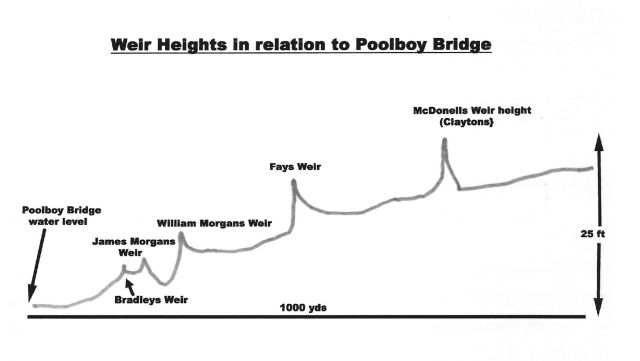 Chart above from An exploration of Milling on the River Blackwater - R.J. Farrelly unpublished thesis for Certificate in Local History NUI Maynooth 2005.
Chart above from An exploration of Milling on the River Blackwater - R.J. Farrelly unpublished thesis for Certificate in Local History NUI Maynooth 2005.
About eight corn mills were in full production in and around Navan during the 1700s and early 1800s, powered by water and steam.
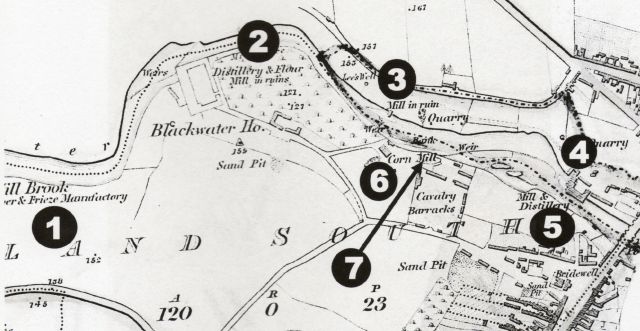
Milling on the Blackwater 18th century to 20th century (Source R.J. Farrelly)
1. Millbrook (Claytons);
2. Blackwater Mill -Fay's Mill (later Spicer's);
3. William Morgan's Mill (later Mortimer's and Elliotts);
4. Skelly's Mill;
5. Bradley's Mill;
6. James Morgan's Mill (later Darker's)
7. Location of skeletons at the site of Navan's St. Mary's Abbey cemetery during construction of the Inner Relief Road.
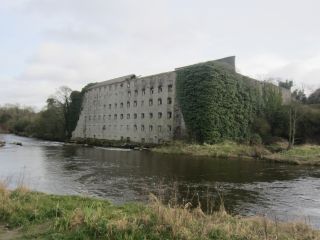

The largest were Fay's, on the Blackwater, one of the largest in the country, (no 2 on map above and pictured above left.) The original plaque is still in situ - (above right) and Murphy's, near the Bridge. (See Blackwater Mill)
Both were allied with extensive distilleries, and equipped with up to date machinery. McDonnell's Paper Mill, at Millbrook (later Claytons Woollen Mill) above Fay's, produced wrapping and wall paper, and some writing paper.
About 1860 the Clayton Brothers of Yorkshire established a woollen mill here, (no.1 in the map above) -the products of which were widely renowned. Clayton's products included serges, much sought after by the clergy, tweeds, blankets, flannels and knitting yarns. In 1882, the firm presented Queen Victoria with a dress, costume and travelling plaid made entirely from Irish wool. In 1882, the firm claimed to be the largest general wool manufacturer in the country.
Source: Clayton's Woollen Mill - a Brief History of a Mill and its Workers 1867-1967, by
Jean Thornton, in Meath Studies in Local History, ed., Liam McNiffe
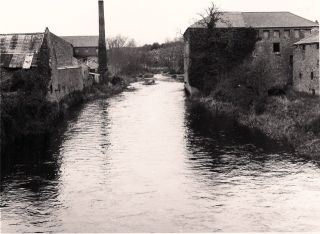
(left) View of Mills on the River Blackwater
as seen from Pollboy Bridge in 1956.
The chimney of Bradley's Mill can be seen on the left in the
area which was cleared for the inner relief road.
This photo was taken in 1956 and is
courtesy of Noel Collins.
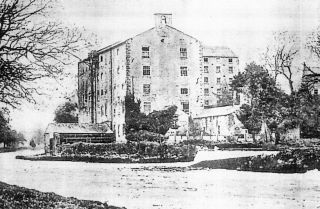
On the Boyne, at Athlumney an Englishman named Coxon,erected a Cotton Mill (left)
in 1802, designed "to give employment to some hundreds of poor children, at present brought up in habits of idleness
Thompson. Statistical Survey of County Meath, 1800.
But by 1823 these mills processed flax, not cotton, and belonged to Francis Blundell.
Source: Piggot's Commercial Directory, 1823
(above) Athlumney Mill on the Boyne.
He leased the whole village of Athlumney from Sir William Somerville, and his work people formed a self contained community. In 1837 260 people were employed there.
Source: Lewis' Topographical Directory.
The premises were later converted to grinding corn, and then became a saw mill. In comparatively recent times the manufacture of furniture was begun there. Today the old mill stands gutted and ruinous astride the long closed canal, while the industry to which it gave birth flourishes in various other parts of the town. The weaving of sacking was an important home industry in and around the town in the 18th century. In the town alone there were over 200 looms, each producing about 2400 yards each year.
Source: Thompson: Statistical Survey of County Meath, 1802.
* note Athlumney Mill was demolished in the 1970s - as it was unstable after a fire.
Other products arising out of the livestock industry included leather, soap, candles, and bacon. And the boom in tillage led to the introduction of the manufacture of farm machinery, He is said to have introduced the horse powered threshing machine into the country
William Mason of Burton-on-Trent setting up a factory in Academy Street about the year 1800. In 1897 R. & W. Mason produced the Winkfield Pride bicycle.
Click on a link below:
Athlumney Mill
Blackwater Mill
Clayton's Woollen Mill on the Blackwater
Elliott's Saw Mill
Spicer 's Mills & Bakery